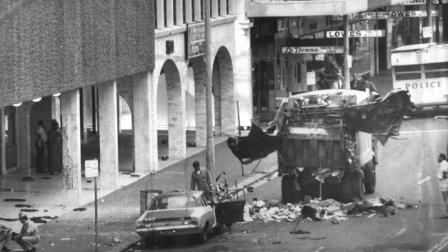The scene outside the Hilton after the bomb exploded.
AFTRS' head of documentary, Rachel Landers, is a documentary maker with a long list of credits that include The Lost Tribe, A Northern Town, The Snowman and The Inquisition.
The Inquisition, on the Wood Royal Commission, screened on the ABC in 2011, and led directly to her latest project, Who Bombed the Hilton? – this time a book rather than a film.
"My interest in the book came from doing The Inquisition, about endemic police corruption in NSW in the mid-90's", Landers said.
"That commissioner had been involved in the aftermath of the Hilton bombing saga. He told me I should have a look at it. I thought it was really interesting. It's still unsolved, it's a big mystery, and it's 40 years ago".
The 1978 bombing outside the Sydney Hilton killed two garbage collectors and one police officer.
Landers initially aimed at making a documentary, but "unfortunately people had been so burnt by this case, and there's been so much court action and defamation and appeals and people suing, that people were very reluctant to go on the record."
"It was also becoming increasingly clear that you had to do a huge amount of research, which is difficult when you're doing a documentary on development funds."
Fortunately, a huge amount of information had been made public by politicians determined to offset conspiracy theories – namely that ASIO planted the bomb themselves.
"In reaction to that, Prime Minister Keating and Bob Carr deposited the entire archive into the NSW state archive about twenty years ago, so I started to go through it."
The decision to make it a book came when Landers was awarded the NSW Premier's History Fellowship in 2011, and was approached by a publisher – "so I said, okay, this is simpler (laughs)."
Now ensconced at AFTRS, the filmmaker sees a conservatism in the way the local industry approaches historical docs.
"We have a very clear sense in Australia of how we like our history documentaries told. We very much like those big-name figures, but they're not necessarily the most interesting people to tell a story. Sometimes it's the minor players and the contradictions in people's accounts that are interesting."
"I think we're a little old-fashioned and traditional in the way we make our history documentaries. I found it liberating [in writing the book] that I could just bring the past to life without having to deal with the vagaries of personality. I could just stick to the thread of the story in a way that [is difficult] when you're interviewing people and setting up studios and cameras."
At AFTRS, Landers is "trying to expose documentary students to the best in the world. It's been interesting trying to reflect best international practice."
"I've done a couple of masterclasses with Alex Gibney. He will take a case like Enron and nobody will talk to him but that doesn't bother him at all, because he will get the guy third corridor down. Access would never interfere with his ability to tell a rattling good story, really well researched, whereas we're sort of like 'well, if you don't have the PM of X'…"
Landers also namechecks Cobain: Montage of Heck's Brett Morgen, singling out his 2007 documentary Chicago 10.
"They took the transcripts of the trial and it's all voiced by actors and the whole thing is animated, but then other sections are just archive. So it's really unusual. Another great film is Rabbit à la Berlin, which tells the story of the Berlin Wall from the point of view of the rabbits in the death zone. Clever, fresh and entertaining way to look at history. Whereas in Australia there is still this thing that our history is boring, and it's anything but."
Having done a book on the bombing, Landers is interested in turning it into a documentary and possibly even a drama.
"Because what I found doing all the research is that I did actually find a very strong protagonist and a very strong antagonist, I found a very powerful through-line. It does seem to have all those things that suit a film."
"I've been talking to the ABC about a doco and talking to some big production companies about doing a drama version. They're interested, but it's early days. It's a great story."



